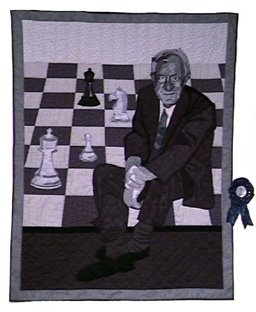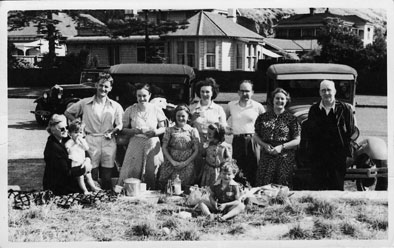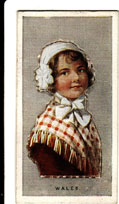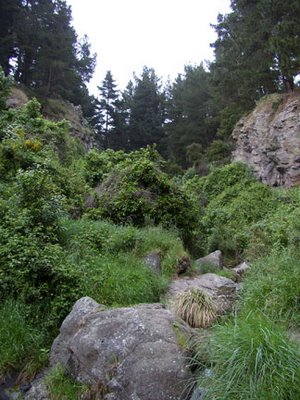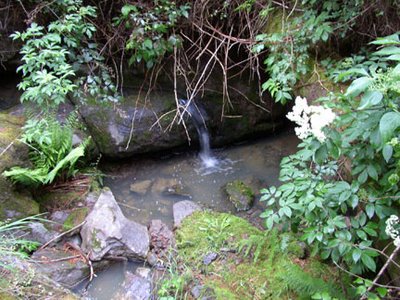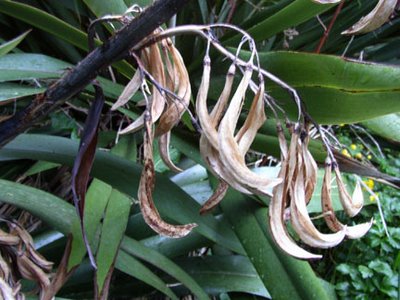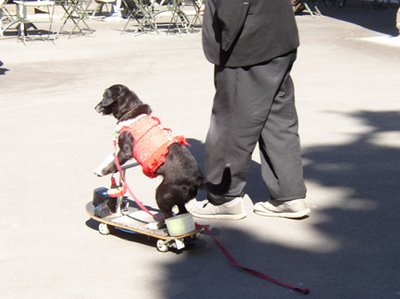For my regulars: there are two posts today, so scroll down if you have missed the other (catching up because blogger wouldn't let me post yesterday). This is my contribution for the
Sunday Scribblings prompt "morning" - a fictionalized account of my grandfather's last morning as a small boy in Scotland.
**********
Johnny stirred in his sleep. Strange bumping sounds were coming through the floor from the room below. He sighed slightly, and rolled over. The Scots of 1880 were early risers, but not this early. He sank deeper into his dreams, until he felt a hand on his shoulder, shaking him awake.
“Johnny, Jessie, Tammas, time to get up”.
Johnny was bewildered. It was still dark. A dim glimmer of gaslight came through the window. There were no cart sounds in the street outside.
“”But it’s..” he started to protest.
“Hush now” his mother said. “Get yeself dressed quietly now, shild I help Tam.” Thomas was not yet two, and still in skirts.
“We’re going to visit cousin William in Glasgow. We need to be ready for the coach.”
The children dressed and stumbled downstairs, still sleepy. Cousin Andrew was there, with their father. They had a big trunk between them. Their mother was packing a few things into it. Johnny glanced at the big coal range, but the fire was out and there was no bubbling pot of porridge. That was strange. Things hadn’t been quite right lately. There had been no bread baked in his father’s bakery for several weeks. No women coming to the store with baskets. The door was shut and there were posters plastered on the windows. The only visitors were men in fancy hats who took away the big ledgers his mother had laboured over in the evenings. She followed his glance now.
“Cousin Annie will give ye your breakfast” she said. “We’re calling on her first afore we catch the coach.” She took a photograph from the shelf and put it in the top of the trunk, moving the others along so the gap didn’t show.
“Come along now’, she said, and then to her husband “Come John, put the whisky bottle away, you’ll need your wits aboot you on the journey.”
He and cousin Andrew picked up the big trunk, and mother and children followed them through the streets of Stirling to cousin Annie’s grand house. Cousin Andrew was a schoolmaster, and better-off than most. When they arrived the men added the big trunk to a pile in the middle of the kitchen. There was much hugging and kissing by the women. Cousin Annie was mother’s best friend. Finally they broke apart.
“Whisht noo” said cousin Annie “the bairns will be hungry”.
And she set out plates of steaming oatmeal on the big kitchen table. Johnny wanted to play with his cousin Willie, but he wasn’t up yet. When Isabella and Willie did get up, they were busy with their breakfast, and their shoe shining, and gathering up their school books. Meanwhile several sturdy big lads had arrived to help with the pile of trunks. Another short walk took them all to the corner where they would catch the coach to Glasgow. There was more hugging and kissing, more than usual. Johnny thought it was strange. Cousin Annie tried to hug him too, but he didn’t want to be kissed, and thrust his hand out for a manly shake, the way his father would. Cousin Annie laughed, and shook his hand. “Well, ye’re a big lad noo”, she said.
When the coach came, there was a space up front by the driver, Johnny begged to sit where he could watch the horses. “Away with ye then” said his father, and he clambered up eagerly, while his parents sat inside with the wee uns. “Take care, d’ye hear?” said cousin Annie, as the horses started to move off. His mother waved and waved, even after they turned the corner, until the town had shrunk away into the distance down the long Dumbarton Road…..
It was most of the morning before the coach arrived at Glasgow. When they pulled into the coach stop, Johnny looked around for cousin Willie, a stern old man, but there was no one in sight. He was just wondering if they would have to find their own way, when his mother tugged at his arm.
“Come along now”, she said “we’re taking anither coach” and she gestured towards a bigger, shinier coach alongside.
“Will it take us to cousin William’s?” Johnny asked, bewildered.
“Hush now, bide a wee” his mother replied, “ye’ll see in a while”.
There was no room by the driver in this coach. Other passengers had taken the coveted spot already, so Johnny had to ride inside with his family. His father sang merry songs and told jokes which made the wee ones laugh and forget for a while that they were tired of sitting still. The coach made its way through the busy Glasgow streets, and Johnny tried to remember what cousin William’s house looked like. But gradually the houses thinned out, and then they were in open fields, getting away from the city.
Johnny fidgeted.
“I need to…” he looked at his mother.
“Can ye wait?” she asked “until they stop to change the horses.”
“I think so,” said Johnny, though he wasn’t to sure. And fifteen minutes later, he was fidgeting more than ever. His mother knocked on the front of the carriage to attract the attention of the coachman. The coach stopped. Mother watched while Johnny and some of the other passengers relieved themselves behind the bushes. Then she took Johnny aside to help with his buttons.
“When will we get to cousin William’s?” he asked.
His mother looked around. They were a little way from the other passengers. “We’re not going to cousin William’s” his mother said. “They’ll think we’re there, and if they don’t find us there, they’ll search at the Glasgow docks. So we’re going to London to catch a boat. We’re going to New Zealand to see Uncle James and Uncle John.”
“Will it take long?” Johnny had only a vague idea about New Zealand. Letters came sometimes from his uncles, who he had never met. “Will it take a whole week?”
“It will take three months” said his mother.
“Three months! Will I be back before my birthday?”
“We’re not coming back” she replied.
“Not coming back?” Johnny was astonished. And then he was dismayed “But I left my football!”
“Your uncles will get you a new football” said his mother. “We had to leave things, it had to look as if we are coming back. Now hush, ye’re a big lad, it’s a secret mind you. Promise me ye’ll say nothing more, until we are safely awa’ from London."
************
More morning musings
here


